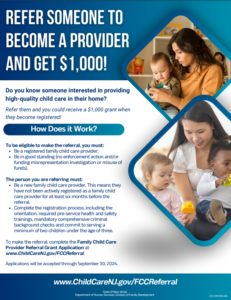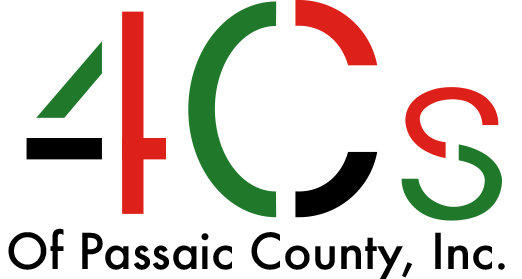Become a Provider!


$1000 Referral Grant(Spanish) $1000 Referral Grant(English)
Financials
March-2024-Reimbursement-Changes
The Maximum Child Care Payments Rates March 2024
https://www.childcarenj.gov/Providers/Grants/ThrivingbyThree
COMING SOON! Thriving by Three Infant and Toddler Child Care Grant New Jersey Bill S2476 was signed into law in June 2022, establishing an infant and toddler child care grant program, known as Thriving by Three. To support this, New Jersey has committed $28 million to strengthen and increase high-quality child care services and programs for our most vulnerable young children. A total of $20 million was allocated to the Department of Human Services, Division of Family Development (DHS/DFD) and $8 million to Economic Development Authority (NJEDA) to implement the Thriving by Three (TBT) Grant Programs, in collaboration with the Department of Children and Families, Office of Licensing (OOL). The Thriving by Three Infant and Toddler Child Care Grant will help support the development and creation of infant and toddler slots and provide technical assistance to providers for the expansion of child care spaces. The first Thriving by Three Grant will be open to licensed child care centers and Head Start/Early Head Start programs. An online application is scheduled to launch by late March. This grant offers providers an initial grant award in year 1 of $3,000 for each new infant or toddler slot. Years 2 and 3 provide the opportunity to apply for an additional $1,200 per infant and toddler slot. A Thriving by Three Grant for registered family child care providers will be available later this year.
https://www.childcarenj.gov/
The state’s child care program can support you with information about applying for child care assistance, licensing information, a search to find child care and inspection reports and information on what makes a quality program.
Become a Registered Family Child Care Provider!
There are many types of child care providers and there are different rules and regulations that pertain to each. The descriptions below and the requirements outlined should start you on your path to becoming a child care provider.
https://www.grownjkids.gov/
Grow NJ Kids is a state-sponsored initiative to raise the quality of child care and early learning throughout New Jersey. Grow NJ Kids gives child care and early learning programs resources to assess and improve their programs, while providing parents with information that allows them to evaluate the quality of programs and make the best choices for their child. The goal is to create a system that encourages ongoing improvement.
https://www.childcarenj.gov/Provider-Search
To find child care providers in your area, or to view Inspection Reports for a provider, enter that name of the provider or choose your search filters and when you are ready, just click “Search” to begin. Our search delivers real-time results, so please be patient.
eclkc.ohs.acf.hhs.gov
The Office of Head Start (OHS) administers grant funding and oversight to the 1,600 agencies that provide Head Start services in communities across the country. OHS also provides federal policy direction and a training and technical assistance (TTA) system to help grant recipients in providing comprehensive services to eligible young children and their families.
https://www.nj.gov/connectingnj/
Connecting NJ is a network of partners and agencies dedicated to helping New Jersey families thrive.
We provide mothers, fathers, grandparents, and guardians free or affordable access to people, organizations, and other sources of information needed to raise healthy children.
Connecting NJ utilizes a county-based, single point-of-entry system that simplifies and streamlines the referral process for obstetrical and prenatal care providers, community agencies, and families.
ALL LICENSED CHILD CARE CENTERS WILL BE EMAILED A MARKET RATE STUDY
The New Jersey Department of Human Services, Division of Family Development, Office of Child Care Operations (DHS/DFD/OCCO) is required by Federal law to conduct a Child Care Market Rate Survey for 2021.
Beginning August 1, 2021 DHS/DFD/OCCO will be emailing a survey to ALL Licensed Child Care Centers throughout the State from the email address DFD-MarketRateStudy@dhs.nj.gov. Participation in this survey is critical for the State of New Jersey to help inform policy recommendations for setting Provider payment rates for the Child Care Subsidy Program.
Community Resources
NJ Human Services Receives $22.6M Federal Grant for COVID-related Mental Health Services
Among the services to be funded are:
· Early Serious Mental Illness (ESMI) Programs: New Jersey will add three new programs to the existing three to serve individuals with first episode psychosis: $2.67 million.
· ESMI Community Integration Programs: DMHAS will be developing six ESMI Community Integration Programs that will provide treatment and supports to individuals after they complete the ESMI program: $2.34 million.
· Crisis Receiving and Stabilization: DMHAS will create four Crisis Receiving and Stabilization programs in the community to provide 24/7 community access to crisis diversion, stabilization, and linkages to services and housing supports. The goal is to have at least once Crisis Receiving and Stabilization program per region: $6.1 million.
· Emergency Room Diversion: DMHAS will create nine programs to serve individuals who frequent the emergency departments. This program will provide care management services, providing support and connecting individuals to needed services to reduce the reliance on emergency services: $4.94 million.
· Legal Assistance with Evictions and Housing due to COVID/Housing Stability. The DMHAS will use funds to support housing stability to avert homelessness through evictions. The resources will be used to enter into a contract with an agency that is staffed to provide landlord/tenant legal services to individuals diagnosed with a serious mental illness facing eviction; $350,000.
· Outreach, including crisis response to underserved populations such as LGBTQI+ individuals and faith-based communities: $1.8 million.
· Mental Health First Aid: DMHAS will expand Mental Health Awareness Training to provide mental health first aid: $400,000.
· Peer Wellness Program: DMHAS plans to fund a wellness program to improve consumers’ self-esteem and promote positive self-care using empirically proven interventions. The peer-run centers that provide support and recovery services to a diverse population of consumers around the state will receive training and supervision on Recovery-Oriented Cognitive Therapy along with Peer Wellness Coaching: $400,000.
· Recovery-Oriented Cognitive Therapy training: Residential service providers in cognitive therapy for recovery will be trained to help to motivate and support consumers to make positive changes in their lives. This is an evidence-based approach that will allow these providers to collaborate with and support their residents’ individual recovery goals and help them engage in meaningful community activities. It will be offered statewide to all residential providers serving individuals with serious mental illness, although group home and providers of supported housing services will be the primary participants in the training: $500,000.
· Implementation of 9-8-8: DMHAS will roll out 9-8-8 to become the new three-digit dialing code for mental health crisis to replace the current National Suicide Prevention Lifeline number by July 2022: $500,000.
· Performance improvement training for providers in the acute care system that serve the seriously mentally ill population: $400,000.
National Association for Family Child Care (NAFCC)
Significant research shows that warm, loving, and home-like settings are natural environments for children during the early years. Family child care is the choice of many families because it provides safety and the comfort of home while offering a consistent caregiver/educator throughout the years.
FINAL Public Notice Child Care State Plan June 3 2021.
Covid-19 Business Support for Child Care Providers
Travel Safety During the COVID-19 Pandemic
COVID-19: Caring For Children and Youth With Special Health Care Needs
Caring for Children with Asthma During COVID-19: Parent FAQs
Child Care School Age Tuition Assistance
Child Care School Age Tuition Assistance (Spanish)
COVID-19 Information for Child Care Providers
Early Childhood Learning and Knowledge Center
School-Age QUALITY COACHING Initiative
NJSACC: The Statewide Network for NJ’s After School Rate Increase Letter in Word Communities envisions a state where every child has access to high quality school-age out of school time programs to strengthen youth, families and
communities. Through our new statewide Quality Coaching Initiative, NJSACC endeavors to support school-age afterschool and out of school time programs and providers with quality coaching through assistance and observation to enhance providers’ delivery of services, professional development, and implementation of strategies to best meet the unique needs of the school-age youth they serve.
National Preparedness Month (September 15-21, 2019) is “Teach Youth to Prepare for Disasters.” FEMA’s Ready Campaign launched newly updated Ready.gov/kids web pages.
Ready.gov/kids is the youth preparedness platform for the Ready Campaign. The site now has an updated look and new, interactive search features. Site visitors can find games, activities, tools to prepare, disaster information, and curricula for kids and teens of all ages, their families, and those who work with youth. Visit the new Ready.gov/kids today and see below for more youth-focused National Preparedness Month events!
Child Care Development Block Grant (CCDBG) Funding Announcement
Safe Haven for Unwanted Children
Classes at The Small Business Development Center
____________________________________________
E-Child Care Training/Fiscal
SFY_2021_ECC_Payment_Dates
Maximum Child Care Payment Rates 03-22
echildcarenj.org (electronic)
Provider IVR User Manual
Provider POS User Manual
E-Child Electronic Payment Dates
SYF 2018 Maximum Child Care Payment Rates
SFY 2018-2019 Co-Pay Schedule
SFY 2020 ECC Payment Dates
SFY 2019 ECC Payment Dates
Notice of Failure to Submit Fee Co-payment
POS Provider Packet
Note: New email for banking is ECCOperations@conduent.com
POS Quick Reference Guide
POS Quick Reference Guide – Spanish
POS Quick Reference Guide – Polish
POS Quick Reference Guide – Haitian Creole
POS Quick Reference Guide – Portuguese
IVR Provider Packet
Provider Communication Emergency Information
IVR Quick Reference Guide
E-Child Care Training Video
Payment Processing and Discrepancy Reporting
Level of Services Definition and Application
Note: New email for banking is ECCOperations@conduent.com
_____________________________________________
Sanction Information for Providers
Provider Sanction Letter Notice
Notice failure to utilize to e-child care form
Provider or affiliate exclusion from participation
Sanction Information for Parents





